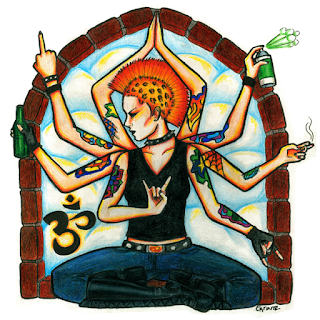Like my wife, I was astonished at how much I enjoyed giving out candy last night for Halloween. We have only this year moved into a hub, and while we're no mistake on the far edge of it-the city limits sign is roughly six blocks to our south-we are also no mistake part of a neighborhood. There are a couple bars, an auto repair shop, many single story homes with immaculate, manicured lawns, and the wide great inland sea just a few yards to our east. And last night we partook, for a couple hours, in one of the
last surviving community regular events. Giving out candy to children who come to the door and ask for it.
In trying to explain my glee to her last night, I made reference to the change of perspective I got when I interned with a kindergarten class. But that's not what I want to write about.
A friend wrote a Facebook post about watching some 17 year olds walking through her neighborhood and going up to doors to trick or treat. They carried a pillowcase for their loot. None wore anything she recognized as a costume. Her response, she reported, was to switch off her lights and ignore their ringing her doorbell.
"At least make a pretence," she told them via her friends on Facebook.
I noted that I was giving candy out to similar groups at my door; but as I thought about it, I started articulating a more complicated idea. In my childhood in the 60s and early 70s, trick or treating was something you did in an area you were already familiar with, with groups of kids you spent your days with (although some, like me, did it with siblings and a parent in tow). But the point was it was in an area and among people you already knew and were comfortable among. This accounted for the frisson of excitement that even in the familiar there could be deliciously spooky surprises.
No mistake, we were acting out a then-comfortably stereotypical American childhood event in which we were safe, no matter how we might enjoy feeling otherwise. For our parents, children themselves of the Depression or the War Years, it was a chance to see their kids enact something that they might have only seen in magazines or heard about from other kids or imagined staring at
costumes available in stores.
All this changed because of fears
real and
imagined, as well as the shrinking and then eradication of neighborhoods and what people thought of as safe. Now younger kids are driven to approved Halloween events at malls. The younger we are the more time we spend online and less among people we might otherwise come to know from playing and exploring together.
Enter a feeling of having missed out on something. Maybe the delightful scare at being at someone's door and your parent absent or more than a short scamper away. Maybe the same parent's reminiscences about when he was young. Maybe even the uncertainty of what candy you might get from stores not sponsoring the mall event: unfamiliar wrapped sweetstuff or homemade candy apples (with or without razor blades) or anything other than that nasty candy corn filler. You're old enough now that your parents feel or you've told them you're too mature for costuming up.
But you're hanging out with friends and in between times or slugs of cheap beer one of them mentions the brother or sister going out in costume that night. And it wakens some urge in you, mixing with the crisp air and early darkness and driving you and the friend out to the street. Maybe you run home to slap some makeup on and rip some old clothes and become a couple zombies, but maybe you don't, you grab a pillowcase or a plastic bag and you say, "Let's get treats"-because you still think of them as treats-and you and the friends go out to explore the neighborhoods that are usually just background to wherever else you're going.
Maybe you're tipsy or a little buzzed because it's the only way you've got to make facing people you don't know, or will be surprised you do know, and asking them to reenact with you a ritual neither one is sure the other understands. Some of us leave the lights on and give them an extra handful because we remember what it is to be 17.
And ultimately, is this really any difference in force and effect from the spiritual impulse that leads people to approach other doors where unfamiliar neighbors might turn them away? And are they treated any differently, especially if they stink of booze or the street? Give them the damn candy.















.png)



